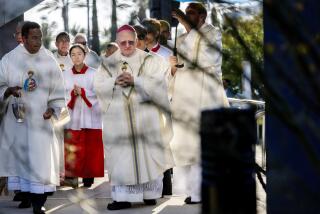Bishops Conspired, Says Abuse Plaintiff
In one of the first legal attacks on the nation’s Roman Catholic leadership, an alleged molestation victim has filed suit contending that bishops conspired over the past 30 years to protect priests who sexually abused children to “avoid detection, public disclosure and scandal.”
The lawsuit filed Monday in Orange County Superior Court alleges that the U.S. Conference of Catholic Bishops even conducted seminars to show bishops and dioceses how to discourage and discredit claims of child sexual molestation, how to conceal or “sanitize” damaging records of accused molesters, and how to quietly transfer the suspected molesters without raising suspicion among congregants.
Some experts say the suit is an innovative legal strategy to hold U.S. bishops accountable for a national wave of molestation cases involving priests that has tarnished the reputation of the church over the past year. Others call it a legal grandstanding ploy with no credibility.
“This is an inevitable and logical conclusion to all that has been revealed in the past year,” said Richard Sipe, a former priest and national authority on sexual abuse of minors in the Catholic Church who has testified for the plaintiffs in many molestation cases. “There is good evidence that the bishops conference has been aware of and consulted on sexual abuse issues.”
An attorney for the bishops conference called the suit “frivolous,” saying that the national association of bishops never engaged in the kind of tactics alleged.
And, as a point of law, the conference, which functions roughly like a professional association for bishops, has no authority to enforce its policies and guidelines in the nation’s 165 autonomous dioceses, said Mark E. Chopko, general counsel for the conference. He said the conference has been named only once before in a sexual abuse suit, and eventually was dropped as a defendant.
“The premise that we’re somehow involved is completely wrong as a matter of law, a matter of fact, and a matter of equity,” Chopko said Monday.
Also named in the suit filed by David Price are the Los Angeles and Orange dioceses and a Maryland treatment center for clerics.
Price, 37, alleges that he was molested as a teenager by Msgr. Michael Harris, his principal at Mater Dei High School in Santa Ana, over a five-year period ending in 1983. The dioceses of Los Angeles and Orange paid $5.2 million last year to settle molestation allegations by another plaintiff against Harris. The former priest has denied all allegations.
Price originally filed suit in 1994, alleging that Harris molested him. A Superior Court judge rejected that case, saying the statute of limitations had expired. In the latest suit, the former Orange County resident has alleged he dropped an appeal of his original case when diocesan attorneys used the threat of $32,000 in legal bills to persuade him to sign a release agreeing to drop the suit.
Price now is charging the Diocese of Orange with fraud, saying church attorneys called his first case against Harris “unmeritorious” even though diocesan leaders already had reviewed a damning report on the monsignor’s alleged sexual misconduct from the St. Luke Institute in Maryland, a treatment center to which Harris had been sent for a five-day evaluation in early 1994.
Price also contends that church officials knew of others who had come forward with sexual abuse allegations against Harris.
A spokeswoman for the Diocese of Orange said she hadn’t seen the suit and couldn’t comment. A St. Luke Institute official said Father Stephen J. Rossetti, its president, was out of town Monday and no one else was available to comment.
In the mid-1990s, Dallas attorney Sylvia M. Demarest sued the nation’s bishops as part of a church molestation case that resulted in a $120-million jury verdict, which eventually was settled for $23 million.
On the eve of oral arguments in 1996 before the Texas Supreme Court, Demarest withdrew the charges against the bishops conference, writing that while she believed the bishops were culpable, “such claims of institutional negligence have been seriously compromised” by recent Texas Supreme Court opinions.
“My theory at the time was there was a conspiracy that included every bishop in the United States,” Demarest said in an interview Monday. “The sexual abuse would be concealed, priests would remain in ministry, no one would know. Everything I alleged turned out to be true this year.”
Demarest said Price’s attorney, John Manly of Costa Mesa, might have better luck because of a meeting of the bishops conference in June, when prelates hammered out a new, high-profile sexual abuse policy that called for zero-tolerance for priests who molest minors.
At the meeting in Dallas, several high-ranking bishops conceded they should have done more to investigate claims and to protect children.
The issue to be decided is whether the sweeping policy set in Dallas translates into new authority for the conference on matters of sexual abuse or whether the procedures were merely suggestions that can be used or ignored by the dioceses.
“By exercising control, they deny they have no control,” Demarest said.
When Manly was told that the bishops’ attorney said the conference had no control over the dioceses, he replied, “Gee, who were those fellows in Dallas? Their actions speak for themselves.”
Father Thomas J. Reese, editor of America, a Catholic weekly magazine, has closely followed the sex scandal and said he doubts that the bishops conference will remain a defendant.
“[The conference] has never been successfully sued because each diocese is autonomous in its legal and financial operations and has responsibility for its priests and employees,” Reese said.
“As for accusing bishops of orchestrating a conspiracy, I don’t think they’re that smart or coordinated to do that.”
More to Read
Sign up for Essential California
The most important California stories and recommendations in your inbox every morning.
You may occasionally receive promotional content from the Los Angeles Times.










